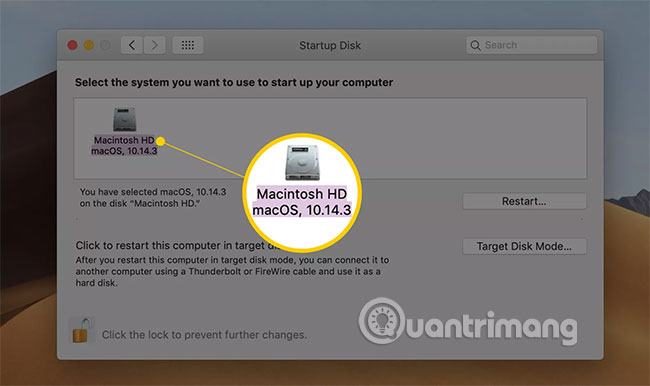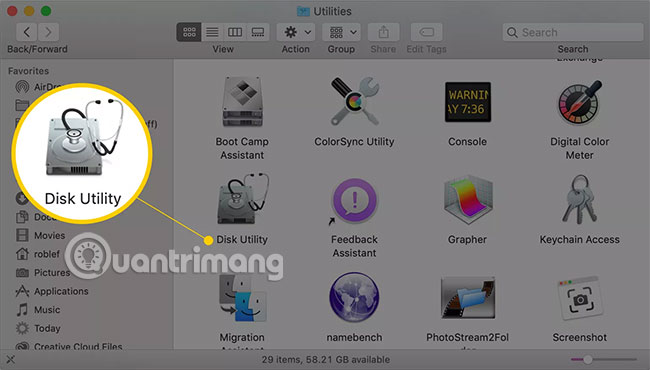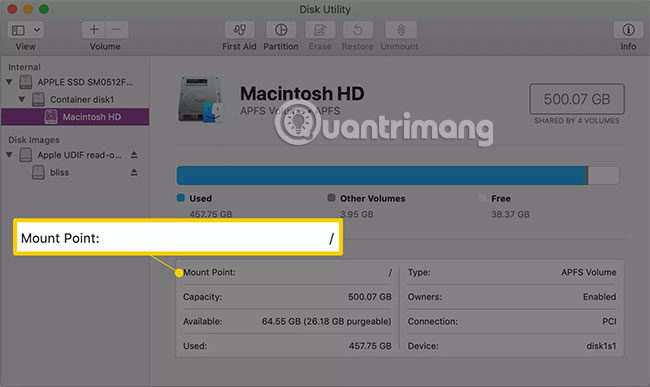How to fix a blinking question mark on a Mac on startup
The blinking question mark is how the Mac tells you that it is difficult to find the operating system that can boot. Normally, the Mac will start the boot process fast enough so that you never notice a blinking question mark on the screen. But sometimes you can see your Mac displaying question mark icon, for a short time before completing the boot process or this question mark will not disappear, waiting for your help.
Error question mark blinking on Mac when booting? What is the fix?
- Shorten the process of finding the boot drive on Mac
- Use Disk Utility to verify which volume is the boot drive
- Try Safe Boot
- Additional troubleshooting guide
Shorten the process of finding the boot drive on Mac
When the question mark blinks, the Mac is still checking all available drives for an operating system that it can use. If it finds an appropriate drive, the Mac will boot. It seems that the Mac finally finds a drive that it can use as a boot drive and ends this process. You can shorten the search process by selecting the boot drive in System Preferences .
1. Click the System Preferences icon in Dock or select System Preferences from the Apple menu .

2. Click on the Startup Disk option in the System section of System Preferences .

3. List of drives currently connected to the Mac and containing OS X, macOS or another bootable operating system installed on it will display.
4. Click the lock icon in the lower left corner, then provide the admin password.

5. From the list of available drives, select the drive you want to use as the Startup Disk.

6. You will need to restart your Mac for the change to take effect.

If the next time you start your Mac, the blinking question mark still does not disappear and the Mac won't boot, you may have a more serious problem than having trouble finding the operating system. It is possible that the selected boot drive is having trouble, possibly a drive error that prevented the boot data needed to be loaded properly.
Use Disk Utility to verify which volume is the boot drive
But before you try the Safe Boot option, go back and check the Startup Disk you selected in the previous step. Make sure it is similar to the drive the Mac is actually using when it successfully boots last.
You can discover which volume is being used as a Startup Disk using Disk Utility, an application that comes with Mac OS.
1. Launch Disk Utility, located at / Applications / Utilities .

2. Disk Utility displays Mount Point of every volume attached to the Mac. The mount point of the boot drive is always the "/" mark . A slash is used to indicate the starting point of a hierarchical file system on a Mac. The boot drive is always the starting point of the file system in Mac OS.
3. In the Disk Utility sidebar, select a volume, then check the Mount Point listed in the volume information area, in the middle of the bottom of the window. If you see a slash icon, the volume is being used as the boot drive. When a drive is not a boot drive, its mount point is usually listed as / Volumes / (volume name) , where (volume name) is the name of the selected volume.

4. Continue to select the volumes in the bar on Disk Utility until you find the boot volume.
5. Now that you know which volume is being used as the boot drive, you can go back and prevent the Startup Disk option and set the volume correctly as the boot drive.
Try Safe Boot
Safe Boot is a special boot method, forcing the Mac to load only the minimum information needed to run. Safe Boot also checks the boot drive for problems related to the drive and tries to fix any problems it has.
Try Safe Boot. When the Mac has booted with Safe Boot, continue and restart the Mac to see if the original question question has been resolved.
Additional troubleshooting guide
If you continue to experience problems with booting the Mac properly, you should check the troubleshooting instructions when starting the TipsMake.com Mac .
If you still have a boot problem, try starting from another device. If you have a recent backup of your boot drive, try booting from a backup that has that boot capability. Remember, Time Machine does not create backups that you can boot from. You need to use a replicable application, such as Carbon Copy Cloner, SuperDuper, Disk Utility's Restore function (OS X Yosemite version backwards) or use Disk Utility to copy the drive on the Mac (OS X El Capitan version or above).
You can use the Mac OS X boot shortcut to temporarily select another boot drive.
If you can boot your Mac from another drive, you need to repair or replace your original boot drive. There are several applications that can fix minor disk-related problems, including Disk Utility's First Aid feature and Drive Genius. You can also use another special boot mode called User Mode to perform repairs on the boot drive.
Hope you are succesful.